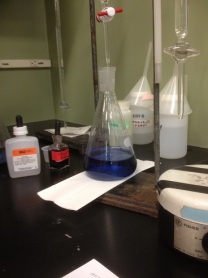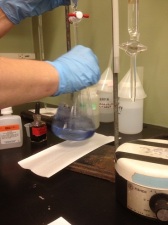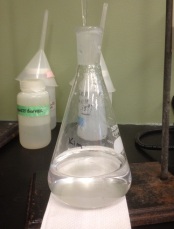So piggybacking off my Hanging with Friends/Words with Friends post, and continuing in the “making your words count” vein, I want to talk about my inability to write for strangers and acquaintances. This really falls in the non-fiction category. While what I’m talking about may not be any more formal than this blog post right now, there are certain mediums where I just freeze up and stress over every word.
E-mails are a big one, and sometimes this falls into the realm of Writer Sage because sometimes these e-mails are to agents or editors. Querying isn’t too big a problem anymore for me, unless I’m making the query very personalized. And then I freak out over one or two sentences. Status queries can be agony. A thank you for some excellent revision suggestions. An e-mail to my editor that contains anything from “Here’s these edits” to an explanation of why I disagree with an edit or a question about one. At work, I might just be sending an e-mail stating that I’m sending something to someone at the main lab. It might be an e-mail with an attachment included, and that’s all I need to say.
But I stress about it.
At work this week, I had two requests for writing. One was a self-evaluation. The other was a resume with my updated lab experience. Now, I have been told time and time again that the self-evaluations are meaningless. Some people in the lab have even copy-and-pasted past evaluation answers into the current (identical) form. Not me. First I worry about the content. The first question is about new things I’ve learned and how I’ve made the lab more efficient and so on. (It’s the only question I think is actually worth anything, tbh). So I worry about what I learned this year vs. last year, and whether it’s impressive enough, and have I filled enough lines with the answer. Then I start rereading it to see if the wording is bad. Do I sound too full of myself here? Does this sound like I think I did more than they think I did (and is this a bad thing or should I inform them of that)? Does this item here seem wishy-washy? Can I say this in a less awkward way?
And, stop. Right there. That’s really important in writing books, but really? Who cares if my sentence was awkward in a self-evaluation? One of our employees can barely read English. Nobody else in the lab is a writer. My first draft will probably be more polished than what anyone else turns in.
But I do three drafts and reread and reread and reread. And reread one last time, just in case I change my mind or some key thing is going to pop out at me. Because that’s what I do with this kind of writing. Hey, at least I don’t send it out to betas.
Except on that resume thing. Because at one point I was looking at the resume of a coworker with similar experience, whose bio I was supposedly going to be able to copy and make minor changes to. And I stared at two of her listed pieces of experience and tried to figure out which one I actually had, because to me they sounded like a different way of describing a similar experience. I finally took it to my supervisor and asked him what he thought. He told me to combine them, lol. After I figured out what to toss and what to add and what to leave alone, I found a new thing to stress about. I remembered that when I was being taught to make a resume, there was a big deal made about the way you list your experience for each job. I had to bullet each piece of experience and start the description of it with a verb. And the verbs all had to be the same tense. But the sample resume didn’t, and that made sense because some things are constantly being done by me (lab work, for example) and some are experience I have, but of things I did in the past. I must have gone through and changed verbs and tenses about 20 times.
But you know what? That’s not going to matter when they read the bio. The reader isn’t going to notice the verb tenses. They won’t care if I shifted them or not. Certainly, nobody’s going to choose whether we get this projected based on a tense shift.
And it’s funny, especially in light of my “making your words count” post yesterday, that the things I stressed most about in these types of writing are the things that barely matter at all. The actual words don’t count in my self-evaluation and work bio, only the message does. Nobody cares how I phrase an e-mail at work, as long as they know what I’m trying to say. A thank you to an agent or an editor could probably be simply “Thanks!” without my trying to express my appreciation in a wordier fashion. No matter how many times I reread that long e-mail to my editor, in the end I will send it with only superficial changes made to it.
When you’re writing for an audience, for entertainment, every word counts, and how you write it counts. Your readers are reading for your style and your words and your phrasing and your message. You need the whole package. And of course, I stress about that, especially in the editing phase.
But not like I stress about these things that just don’t matter. Weird, huh?
Lots of love,
Sage
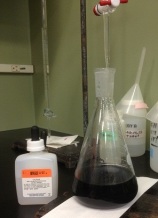 This is all pretty cool, but my favorite part comes next. Now’s when we take this deadly Draught and turn it back into water.
This is all pretty cool, but my favorite part comes next. Now’s when we take this deadly Draught and turn it back into water.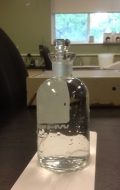

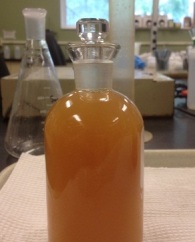
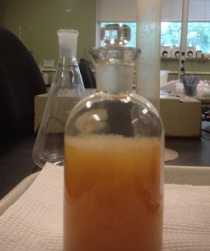
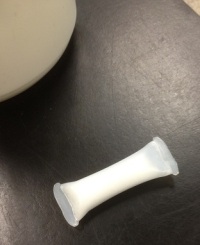
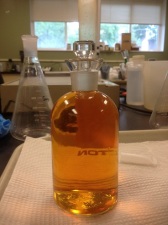 Ta-dah! Felix!
Ta-dah! Felix!